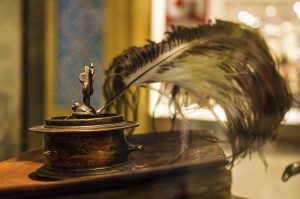The Power of Handwriting
by Susan ford
Many of us think that we cannot write well, but what if it is just the writing medium that is wrong? What if it is merely that the format we are trying to write in which is holding us back and limiting our true potential?
When I pick up a pen and touch it to a clean, crisp sheet of paper, the words flow from me or through me without pause. They come out onto the page and they live there. There is no simultaneous editing, no revising, no second guessing. The words simply exist, unapologetically owning their space.
On a computer, the delete and backspace keys are ever present, and their prompt use so ingrained in us. With them we instantly question whether the words are right, whether the work is good. The mere presence of these keys simply fuels self-doubt and internal editing in a way that writing on paper does not.
What is it about writing on a computer that makes it so much more creatively challenging than pen and paper? Typing feels more impersonal than writing. Typing on a keyboard is cold, analytical and formulated. The creative process feels stifled, stunted somehow and too often the finished work reflects that.
All too often the finished product of a computer-generated letter feels different. How do you feel reading a typed love letter? Does it carry with it the same impact and emotional poignancy as one written by the hand of your lover? When we trade a pen for a keyboard, we lose the subtle visual nuances of the pen pressing harder into the paper and the letters themselves slanting forward as our lover’s passionate words build to a crescendo.
Typing cannot begin to replicate the softly imperfect elegance of intricate handwritten script. It is unable to duplicate the distinctive scrawl and hesitant strokes of a young child penning her first Mother’s Day card.
My cursive script is utilitarian and undeniably rudimentary alongside that of a writer from a mere hundred years ago. What will handwriting look like in another hundred years? Will our great grandchildren even be taught the art of gliding their pens across the paper, seamlessly stringing letters together to form words? Will they understand the meaning of the reminder to “dot your i’s and cross your t’s” or will that too be lost to the annals of time, a relic of a bygone age?
What will happen one day when we no longer touch pen to paper? What will we lose? Will we even know what it is that we have lost?
For that matter, I argue that we have we lost something already. I have never written with a handmade quill pen by the dim light of a candle or kerosene lamp. I have never read a book that was painstakingly written and illustrated by hand. Would the experience be richer and more organic?
Do words carry just as much meaning when they are easily and rapidly typed as they do when they are scratched out on paper by a clenched and tired hand holding a freshly sharpened quill? Were words chosen more carefully back then because once written, they were harder to delete? Did they mean more for the effort that it took to bring them into existence?
Although you can simply send your significant other a text telling them you love them, or you can just as easily email your best friend to say that you appreciate them being by your side all these years, I encourage you instead to simply take out some fresh sheets of beautiful stationery, sit down at your desk with your favorite pen and handwrite that letter to your friend or family member.
The words may not be perfect. The writing may not be elegant and on unlined paper, your words may curve up or down the page. By the time you are finished, your hand may even cramp up reminding you as well of this fading skill, but when the recipient reads your letter, they will feel the weight, the meaning, and the love behind those words more deeply than they ever could if it were typed.

“Do words carry just as much meaning when they are easily and rapidly typed as they do when they are scratched out on paper by a clenched and tired hand holding a freshly sharpened quill?”